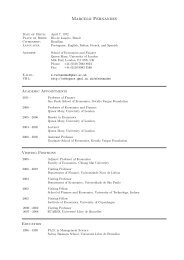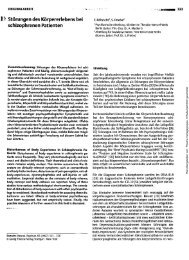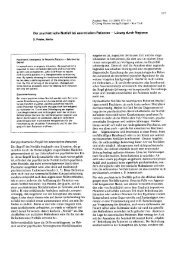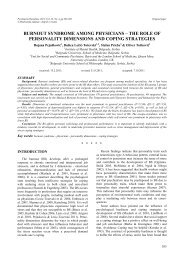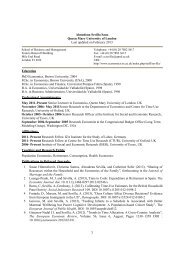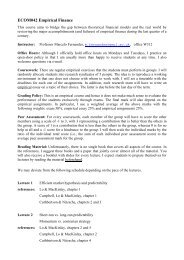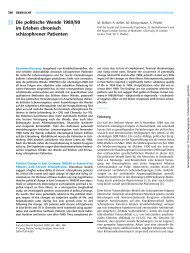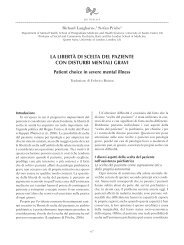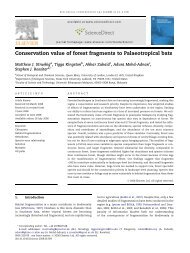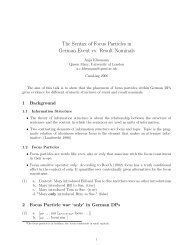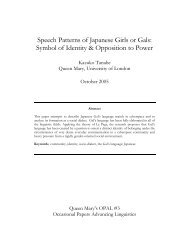Proofs - Personal Webspace for QMUL - Queen Mary, University of ...
Proofs - Personal Webspace for QMUL - Queen Mary, University of ...
Proofs - Personal Webspace for QMUL - Queen Mary, University of ...
You also want an ePaper? Increase the reach of your titles
YUMPU automatically turns print PDFs into web optimized ePapers that Google loves.
© 2012 Elsevier Masson SAS. All rights reserved.<br />
European Psychiatry 27 (2012) / supplement n°2 / S10-S16<br />
Socio- economic status and emotional distress <strong>of</strong> female Turkish<br />
immigrants and native German women living in Berlin<br />
MC. Aichberger a, *, Z. Bromand b , A. Heredia Montesinos c , S. Temur- Erman d , A. Mundt e ,<br />
A. Heinz f , MA. Rapp g , M, Schouler- Ocak h<br />
ABSTRACT<br />
<strong>Pro<strong>of</strong>s</strong><br />
68767<br />
EUROPEAN<br />
PSYCHIATRY<br />
THE JOURNAL OF THE EUROPEAN PSYCHIATRIC ASSOCIATION<br />
a Department <strong>of</strong> Psychiatry and Psychotherapy at St Hedwig Hospital, Charité – <strong>University</strong> Medicine Berlin, Große Hamburger Straße 5- 11, 10115 Berlin , Germany<br />
b Department <strong>of</strong> Psychiatry and Psychotherapy at St Hedwig Hospital, Charité – <strong>University</strong> Medicine Berlin, Germany<br />
c Department <strong>of</strong> Psychiatry and Psychotherapy at St Hedwig Hospital, Charité – <strong>University</strong> Medicine Berlin, Germany<br />
d Department <strong>of</strong> Psychiatry and Psychotherapy at St Hedwig Hospital, Charité – <strong>University</strong> Medicine Berlin, Germany<br />
e Psychiatric Day Hospital, Department <strong>of</strong> Psychiatry and Psychotherapy at St Hedwig Hospital, Charité – <strong>University</strong> Medicine Berlin, Germany<br />
f Department <strong>of</strong> Psychiatry and Psychotherapy, Charité – Berlin, Germany<br />
g Geriatric Psychiatry Center, Department <strong>of</strong> Psychiatry and Psychotherapy at St Hedwig Hospital, Charité – <strong>University</strong> Medicine Berlin, Germany<br />
h Psychiatric Outpatient Clinic, Department <strong>of</strong> Psychiatry and Psychotherapy at St Hedwig Hospital, Charité – <strong>University</strong> Medicine Berlin, Germany<br />
Keywords:<br />
Female Turkish immigrants<br />
Socioeconomic status<br />
Poverty risk<br />
Unemployment<br />
Emotional distress<br />
1. Introduction<br />
Income inequality and a continuously increasing gap<br />
between social groups in Europe [51] is not only challenging<br />
social politics, but also poses a challenge <strong>for</strong> effective public<br />
* Corresponding Author.<br />
E-mail address: marion.aichberger@charite.de (M. Aichberger)<br />
ISSN 0924-9338<br />
June 2012<br />
Vol. 27 - Supplement n°2<br />
pp. S1-S81<br />
Migration<br />
and Mental Health<br />
S1 Editorial<br />
A. Heinz, U. Kluge<br />
S4 The willingness to participate in health research<br />
studies <strong>of</strong> individuals with Turkish migration<br />
backgrounds: barriers and resources<br />
D. Dingoyan, H. Schulz, M. Mösko<br />
S10 Socio-economic status and emotional distress<br />
<strong>of</strong> female Turkish immigrants and native<br />
German women living in Berlin<br />
MC. Aichberger, Z. Br omand, A. Heredia<br />
Montesinos, S. Temur-Erman, A. Mundt,<br />
A. Heinz, MA. Rapp, M. Schouler-Ocak<br />
S17 Mental health <strong>of</strong> Turkish women in Germany:<br />
resilience and risk factors<br />
Z. Bromand, S. Temur-Erman, R. Yesil,<br />
A. Heredia Montesinos, MC. Aichberger,<br />
D. Kleiber, M. Schouler-Ocak, A. Heinz,<br />
MC. Kastrup, MA. Rapp<br />
S22 The infl uence <strong>of</strong> stigma on depression, overall<br />
psychological distress, and somatization<br />
among female Turkish migrants<br />
A. Heredia Montesinos, MA. Rapp, S. T emur-<br />
Erman, A. Heinz, U. Hegerl, M. Schouler-Ocak<br />
S27 Translation and adaptation <strong>of</strong> the Zung<br />
Self-Rating Depression Scale <strong>for</strong> application<br />
in the bilingual Azerbaijani population<br />
F. Mammadova, M. Sultanov, A. Hajiyeva,<br />
M. Aichberger, A. Heinz<br />
S32 Construction and interpretation <strong>of</strong> self-related<br />
function and dysfunction in Intercultural<br />
Psychiatry<br />
A. Heinz, F. Bermpohl, M. Frank<br />
S44 Explanatory models and concepts<br />
<strong>of</strong> West African Malian patients<br />
with psychotic symptoms<br />
F. Napo, A. Heinz, A. Auckenthaler<br />
S50 How to express mental health problems:<br />
Turkish immigrants in Berlin compared<br />
to native Germans in Berlin<br />
and Turks in Istanbul<br />
A. Vardar, U. Kluge, S. P enka<br />
S56 Health services and the treatment<br />
<strong>of</strong> immigrants: data on service use, interpreting<br />
services and immigrant staff members<br />
in services across Europe<br />
U. Kluge, M. Bogic, W. Devillé, T. Greacen,<br />
M. Dauvrin, S. Dias, A. Gaddini, NK. Jensen,<br />
E. Ioannidi-Kapolou, R. Mertaniemi,<br />
R. P uipcinós i Riera, S. Sandhu, A. Sar vary,<br />
JFF. Soares, M. Stankunas, C. Straßmayr ,<br />
M. Welbel, A. Heinz, S. Priebe<br />
S63 The concept <strong>of</strong> “intercultural opening”:<br />
development <strong>of</strong> an assessment tool<br />
<strong>for</strong> the appraisal <strong>of</strong> its current implementation<br />
in the mental health care system<br />
S. P enka, U. Kluge, A. Vardar, T. Borde,<br />
D. Ingleby<br />
S 70 Cross-cultural training in mental health care<br />
– challenges and experiences from Sweden<br />
and Germany<br />
S. Bäär nhielm, M. Mösko<br />
S75 Teaching psychiatry and establishing<br />
psychosocial services – lessons<br />
from Afghanistan<br />
I. Missmahl, U. Kluge, Z. Br omand, A. Heinz<br />
S80 Epilogue<br />
A. Kleinman<br />
Background.- Many immigrants face more economic strains and hardship than non- immigrants.<br />
Income inequality and an increasing social gap between immigrants and non- immigrants in Europe<br />
warrant further studies on the impact <strong>of</strong> socioeconomic factors on health in immigrant groups. The<br />
purpose <strong>of</strong> this study was to examine the association <strong>of</strong> socioeconomic status (SES) and emotional<br />
distress in women <strong>of</strong> Turkish descent and in women <strong>of</strong> German descent.<br />
Methods and Subjects.- A total <strong>of</strong> 405 women <strong>of</strong> German or Turkish descent residing in Berlin were<br />
interviewed. Emotional distress was assessed by the General Health Questionnaire- 28 (GHQ- 28),<br />
and SES was examined by level <strong>of</strong> education, employment status, and income. The associations <strong>of</strong><br />
emotional distress and SES were estimated in multivariate linear regression analyses.<br />
Results.- Unemployment was associated with increased levels <strong>of</strong> emotional distress in all women,<br />
with the highest level <strong>of</strong> distress in the group <strong>of</strong> unemployed Turkish women. The overall SES<br />
level was related to a greater level <strong>of</strong> emotional distress in Turkish women, but not in German<br />
women (- 3.2, 95%CI - 5.9 – - .5; p=.020 vs. - .8, 95%CI - 2.7 – 1.2; p=.431). Further stratifi ed analyses<br />
by relationship status revealed that the association <strong>of</strong> SES and emotional distress only remained<br />
signifi cant among single women.<br />
Conclusion.- The impact <strong>of</strong> socioeconomic hardship appears to be complicated by social roles and<br />
expectations related to these. Further in- depth study <strong>of</strong> the complex nature <strong>of</strong> the interaction <strong>of</strong><br />
social roles and socioeconomic position in female Turkish immigrants in Germany is needed to better<br />
understand differing risk patterns <strong>for</strong> emotional distress.<br />
© 2012 Elsevier Masson SAS. All rights reserved.<br />
health ef<strong>for</strong>ts. Increased vulnerability <strong>for</strong> mental health problems<br />
among people who live in poverty [11], or have less access<br />
to social resources [44] has been reported since early in the last<br />
century [1,41]. Alongside more ‘traditional’ risk groups such as<br />
single parents and the unemployed [38,46], immigrants have<br />
been a societal group at particular risk <strong>for</strong> lower socio- economic<br />
status (SES) [49,58]. Some epidemiological studies examining<br />
mental health in immigrant and ethnic minority groups suggest<br />
an increased risk <strong>for</strong> psychotic disorders in specifi c immigrants<br />
groups such as Caribbean immigrants in the UK [14,17]. Less



